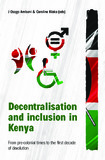Chapter 1- Introduction
Abstract
Mahmood Mamdani’s Citizen and subject is a good starting point for conceptualising power and marginalisation in Africa generally and even Kenya specifically. This framework appreciates that the colonial
project was both illegitimate and contradictory from the very beginning.
It was illegitimate because it was imposed on the native populations. It
was contradictory in the sense that its objects and means were bad even
for its own existence. The challenge that faced the colonialists was how,
as a foreign minority race, they could rule over native majority races but
yet still extract resources and labour not just for the settler community
but also for their economies back in Europe. The result was always a
bifurcated state in which a small racial minority enjoyed privileged
‘citizenship’ status while the majority was mistreated as ‘subjects’.
1Colonial history in Africa generally and Kenya especially is one
of state-sanctioned usurpations against the natives. Colonial policies of
apartheid relegated native Africans to the reserves where marginalisation,
discrimination and other violations of human rights were prevalent.
Although the colonial project in Africa commenced after the French
and American revolutions, the colonialists only applied the rights
associated with these uprisings to the white minorities, the citizens. This
privileged group, which, in Kenya’s context, inhabited fertile highlands
and better-furnished urban areas, enjoyed the freedoms of assembly,
association, expression, among others, and were gradually entitled to representation in the legislative bodies.
On the other hand, the native
Africans were not entitled to the above-mentioned rights. As subjects,
the native Africans did not bear even critical rights like participation and
representation until towards the end of the colonial epoch. Moreover,
displacements, landlessness, police brutality, and poor infrastructure,
among others, were some of the main highlights of life in the native
reserves. Colonial power in the native reserves was, plainly speaking,
authoritarian. Instead of rights, the colonial powers governed Africans
through a modified system of customary law whose administrators, the
chiefs, were under their total control and instruction.
African customs
only applied where they did not threaten colonial power and western
civilisation. Native customs were modified to align with colonial values
like patriarchy and the extractive objectives of the colonial state and its
morality. Colonial policy and morality enhanced the marginalisation of
women, youth, persons with disabilities (PWDs), rural populations and
other minority groups.

